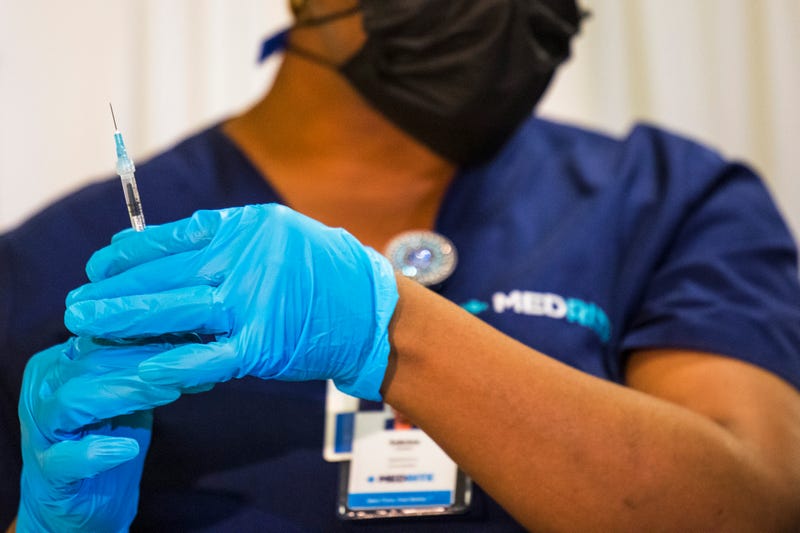
Starting Monday, any healthcare workers that were previously granted religious exemption from receiving a COVID-19 vaccine must show valid proof of either a first dose COVID-19 vaccination or a valid medical exemption for their employers. If they do not, they risk being terminated from their jobs.

The New York State Department of Health informed hospital chief executive officers, nursing home operators and administrators, adult care facility administrators, and home care and hospice administrators of this last Monday in a letter to make sure that all personnel covered under the Department’s Prevention of COVID-19 Transmission by Covered Entities Emergency Regulation who previously had been granted religious exemptions have that proper documentation by Monday, Nov. 22.
This emergency regulation originally went into effect back on Aug. 26 until a stay was issued by a judge in a federal court in the Northern District of New York on Sept. 30. This meant the state could not force anyone asserting their religious exemption argument to be terminated if they were not vaccinated. However, the Second Circuit Court of Appeals overturned the stay back on Oct. 29.
Even if a healthcare worker has filed a valid religious exemption application, as of Monday, they will still be exposed to potentially losing their job.
"Albeit, their lawsuit won't be dismissed - they've preserved the issue from a litigation perspective - but there's no court prohibition to implement the termination provisions of the mandate," said former New York Attorney General, current partner with Lippes Mathias, Dennis Vacco.
"As far as religious exemptions, they have been an issue," said defense attorney Paul Cambria of the matter. "A lot of the courts have not allowed religious exemptions because they found that the public health was of greater good. And as far as I know, there's no case currently where a court has ruled that the state can, in fact, refuse to grant a religious exception, if you will. So it appears that the mandate is in place. Unless some court stays it, they will have to make a choice."
The state does have the option of extending the emergency regulation currently in place, but according to attorney Todd Aldinger, he believes no extension will be made for the potential complications that could follow for the state.
"If they extend it, they open it up to notice and comment. That means that any member of the public can submit alternative regulatory options, scientific studies that contradict the regulation, and then the state has to go through those and has to adequately respond to them. That is a much higher burden," Aldinger said. "The normal regulatory process uses that burden, but there's an emergency regulation provision which they used. But again, they can only have that emergency regulation be in effect for 90 days before they open the regulation up to notice and comment and have to consider conflicting scientific evidence."

Many healthcare workers around the state have been fighting for the right to remain unvaccinated and keep their jobs, fighting the mandate handed down by New York State.
Where Vacco believes the healthcare workes have a case to be made in their fight is the fact that they do not have another option, compared to other workers, other that getting vaccinated or losing their jobs.
"New York State has provided to teachers in the educational setting, there's no vaccination mandate for teachers, but yet there is for healthcare workers," Vacco explained. "The teachers have been provided an option: You either get vaccinated or get regularly tested. No alternative has been provided to the healthcare workers in New York State. It's either a flat get [vaccinated] or lose your job."
As for Aldinger, he believes that policies with such importance as this one, whether on a state or federal level, should be voted on by the legislature in place.
"When there's an issue of critical public policy importance, that's what we have a legislature for," Aldinger said. "If a legislature votes on something, they pretty much set a date and it's fairly well-insulated from court challenges. But there hasn't been any action on that in that direction, so what we're seeing is just deadlines being pushed, uncertainty if whether regulations are going to be extended or naturally expire, and then uncertainty about what courts are going to do with the numerous pending lawsuits."
As for what comes next with the state mandate, Aldinger doesn't know if anyone can predict or explain what is going to happen, because it's all in flux.
"There's a number of different cases that have been brought, there's competing state and federal mandates, and there's the number of cases that are pending decision," Aldinger said. "And again, the federal government has also moved dates around, the state regulation nationally expires on [Nov. 24], and who knows if they try to extend it. There's just too much in flux right now, which is really unfortunate because it's almost impossible for anyone to plan their lives based on this."

But what about those healthcare workers that wish to remain unvaccinated? What can they do to try and keep their jobs going forward?
"They have to talk to their employer and see what their employer is willing to accept. It's as hodgepodge and a mix of so many different conflicting things right now that I think a lot of employers are just winging it," Aldinger said. "You see that some hospitals are saying you have to have the vaccine by [Nov. 22], Dec. 4, Dec. 5. There really is no consistency here, and that's because of all the uncertainties of how these regulations are going to be enforced by the courts or if they're going to be extended by the executive branch."
And how about those workers that could see their position terminated come Monday?
"They would have to file an action. They would have to have a judge issue a restraining order, holding these mandates in abeyance, pending a decision by the courts. That's what needs to be done, otherwise their employer [can say] these are the terms of employment. If you want to work here, you have to abide by the terms. That's basically the way it is," Cambria said.
"With a government-affiliated organization, people can make the constitutional claim that a religious exemption is something that has to be respected. For a private employer, the constitution doesn't apply except for things like discrimination based on age, sex, etc. A government-affiliated employer would be bound by the constitution, and again, some of them would have to file an action, and they would have to have a judge issue an injunction or a restraining order."
With the fight against the New York State COVID-19 vaccine mandate likely long from over, Vacco very much believes there are serious constitutional issue at play that could one day lead to the mandates potentially being reversed.
"While courts have been reluctant to pause or stay the implementation of these mandates, I think in the fullness of time in the brighter light of day, these legal challenges will have some traction and will result some of these mandates being reversed," Vacco said. "Unfortunately, when that time comes, many people will have already lost their jobs, which then raises a larger question as to, 'What's next?' If they win and they've lost their job, then there's a whole 'nother set of issues that will have to be raised on behalf of those employees."

As for the federal mandate set in place by President Joe Biden for employers with 100 or more employees, that is currently put on hold after the Fifth Circuit Court of Appeals stayed that after challenges from many states and other federal circuits around the country.
